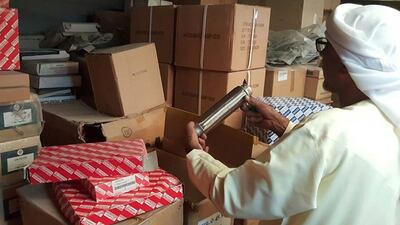ABU DHABI // Countries must consider criminalising the buying of counterfeit goods if a trade linked to organised crime and terrorism is to be beaten, a senior Interpol officer says.
Francoise Dorcier, a criminal intelligence officer in the organisation’s anti-counterfeit trafficking unit, said the fakes trade remains a low-risk, high-profit industry that is often not considered a crime in many parts of the world.
Her comments echo those of Maj Gen Abdul Obaidli, whose Dubai Police unit is tasked with tackling counterfeit goods.
Last week, Maj Gen Obaidli said he supported moves to make buying fake goods a criminal offence. Buying perpetuated “the constant battle” between the authorities and police, he said.
“We want to make countries understand that this is a crime because it poses a risk to the health and safety of consumers,” Ms Dorcier said at the Unity for Security Forum in Abu Dhabi on Thursday.
“So, some countries have strong legislation and have got very deterrent penalties, some not yet, but we do believe that it is going to change.”
At present, selling fake goods in the UAE is illegal but buying them is not. Many consumers and tourists are lured to markets in Karama and Satwa by the prospect of convincing fakes.
Sellers are typically fined Dh15,000 for the first offence, Dh30,000 for the second and arrested for subsequent offences.
Most countries target sellers rather than buyers, but in France tourists and residents can be fined up to €300,000 (Dh1.18 million).
Italy has also targeted and fined buyers during summer campaigns. The UK’s border agency confiscates fakes but the government decided against criminalising buying after a review several years ago, as have many others.
As law enforcement across the globe raid markets and street sellers, organised counterfeiters have found far greater profits and far lower risks online.
“The environment is changing very rapidly,” Ms Dorcier said.
“Criminals are resorting to technology and we must keep pace with the way criminals use these technologies.
“So they create websites to sell illicit products but they also use licit e-commerce platforms and social media to spread all these counterfeit products, so it’s becoming a real concern for law-enforcement.”
Is it not just Louis Vuitton bags and Armani watches that perpetuate the trade, but “also daily consumer products,” she said.
“We must also raise awareness among the public, for them to understand that they need to be cautious in the way they buy products,” she said.
Laurent Venetz, head of anti-counterfeiting at Nestle, one of the world’s largest food suppliers, said collective action is needed to tackle criminals who manufacture and sell knock-off food and drink products, such as the Europol-Interpol Operation Opson.
“There are 50 countries so far and I hope we get the UAE on board very soon, because I’m very grateful for the work the UAE Government and the Economic Department are putting in place to protect consumers and their health,” he said.
Jennie Martel, chief of brand protection at Colgate Palmolive, said major focus has been put on the Middle East and Africa, where a great deal of fake everyday goods are being sold.
“A single container of counterfeit is usually part of a much bigger operation spanning different continents, industries, and involving large and sophisticated criminal enterprises,” she said.
“In the last two years alone, UAE authorities have seized a significant number of counterfeits, in the hundreds of thousands. They were all followed by product destruction, which prevented potentially dangerous products from reaching consumers”
cmalek@thenational.ae

